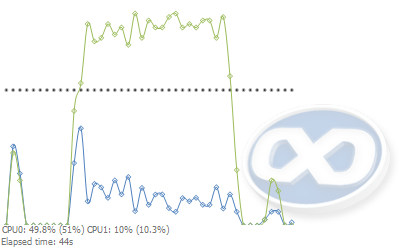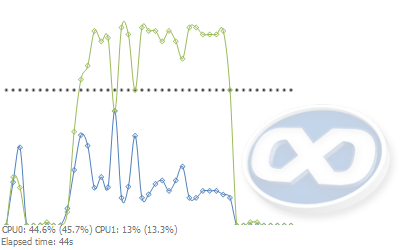Video Decode Performance - 40Mib/s unprotected MPEG-4/AVC
Next we tested MPEG-4/AVC playback using a 40Mib/s clip in an .mp4 container, using WinDVD again under the same Vista x86 environment and 158.14 ForceWare driver. Hardware acceleration was checked and unchecked between runs and WinDVD restarted each time.
Hardware Acceleration

Playback stutters at the beginning and AV loses sync quickly, suggesting no GPU acceleration. Indeed power consumption at the wall was the same for playback under both situations. Here's the unaccelerated case.
No Hardware Acceleration

While CPU core affinity for playback is shown to be different, the average CPU loads are similar (they're actually higher overall in the accelerated case, but that's just a function of that particular snapshot). So either AVC is accelerated in a different way and we're not testing it properly, or we're using the wrong container format, or it's not exposed in the driver/software yet, or something else, but the (admittedly demanding) test clip receives no acceleration here.
Video Decode Performance Summary
High bitrate VC-1 is easy meat for G84 and at 2560x1600 fullscreen no less, from a 1080p AACS protected HD-DVD in a player that requires HDCP support. A high bitrate (~25Mib/sec) H.264 HD-DVD title is on its way and we'll post the decode performance results from that disc when it arrives.
It's a shame that AVC in an .mp4 container showed no acceleration (performance is similar on 8800 GTX) such that we could evaluate the power and performance advantage to using a G84 for AVC video acceleration using PVHD. As soon as we can do that we will.
It is probably worth noting that most HD-DVD titles use VC-1 though, which is the reason why we couldn't even find a H.264 movie in time to test it for launch day, at least in bricks-and-mortar stores nearby. Blu-Ray titles are much more frequently based on MPEG-2 (the previous video standard which any modern GPU, or even CPU, could eat for breakfast), but when they aren't, the ratio of H.264-coded titles is at least much more respectable. Either way, you probably wouldn't be too happy if your HTPC choked on even just a small proportion of movies out there, so H.264 remains very important in our eyes.
